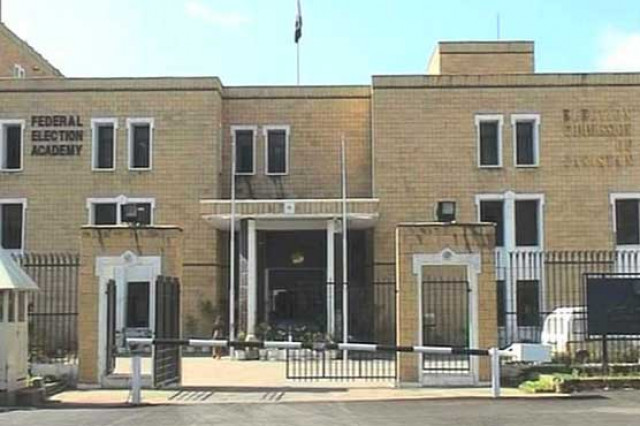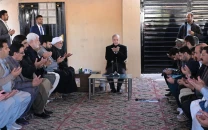Disposal of petitions: Suspend MPs causing unnecessary delay, says ECP
Election tribunals told to accelerate their work and invoke provisions of the law

A file photo of Election Commission of Pakistan. PHOTO: ECP.GOV.PK
The Election Commission of Pakistan (ECP) reminded poll tribunals on Tuesday that they ought to speed up their work as well as invoke laws that empower them to suspend any lawmaker for obstructing or delaying the disposal of petitions against them.
The development came a day after Pakistan Tehreek-e-Insaf (PTI) chairman Imran Khan met the chief election commissioner (CEC), Justice (retd) Raza Khan.
In the meeting, the PTI chief complained about the delay in deciding the post-election complaints which were supposed to be decided under the law within 120 days.
Appearing before the media after the meeting, Imran said he had asked the CEC to suspend National Assembly Speaker Sardar Ayaz Sadiq against whom his petition is pending for more than 18 months.
The PTI leader had lost against Sadiq from NA-122 Lahore. He accuses the ruling Pakistan Muslim League-Nawaz (PML-N) of delaying the proceedings, a charge it vehemently denies.

“Provided also that where delay in the proceedings is occasioned by any act or omission of a returned candidate or any other person acting on his behalf, the tribunal itself, or on application of the aggrieved party, shall after issuance of the show cause notice to the returned candidate, within 15 days from the date of show cause notice, may order that returned candidate has ceased to perform the function of his office either till the conclusion of the proceedings or for such period as the tribunal may direct,” reads a paragraph the ECP quoted from the law in its letter sent to all the tribunals. A copy of the letter is available with The Express Tribune.
Soon after May 11, 2013 election, the ECP set up a total of 14 tribunals, five for Punjab and three for each of the provinces, comprising retired judges of the high court to hear election complaints. Under the amended law, these poll tribunals were supposed to hear a petition on a day-to-day basis and decide a case within 120 days.
Section 67 of the Representation of the Peoples Act, 1976 also mentions that no party in the case will be given an adjournment for more than seven days.
In case a litigant needed more than seven days of adjournment during these 120 days, the tribunal will impose a fine.
Similarly, if a petition is not decided within four months, and the case lingers on, the party seeking adjournment would have to pay Rs10, 000 for every adjournment and that too would not be beyond three days.
If this does not work and the tribunal feels that the winner from a constituency against whom his opponent had filed rigging charges, was causing unnecessary delay in deciding the case, the tribunal having powers equal to a high court, can suspend membership of such a lawmaker.
It is also upon the tribunals’ discretion to decide how long the member will remain suspended. It can stop a member from working till the final decision of the case.
When ECP notified 14 Tribunals on June 3, 2013 a total of 403 cases of alleged rigging in the elections were sent to them by the ECP. Any of the contesting candidates can send application to ECP within 45 days after polls if she/he feels the elections were rigged. The ECP after analysing the charge-sheet sends the case to the tribunals.
Most of the petitions sent by the ECP were disposed off after few hearings but the petitions involving complicated matters remained pending.
These tribunals were supposed to complete their work within one year in any case and were to expire in June 2014.
One year after, though the number of pending cases reduced but still over 100 were pending. The ECP in the meantime reduced the number of tribunals to 11, and disbanded the ones who completed their work. It extended the tenure of remaining ones for another six months.
Published in The Express Tribune, February 4th, 2015.



















COMMENTS
Comments are moderated and generally will be posted if they are on-topic and not abusive.
For more information, please see our Comments FAQ